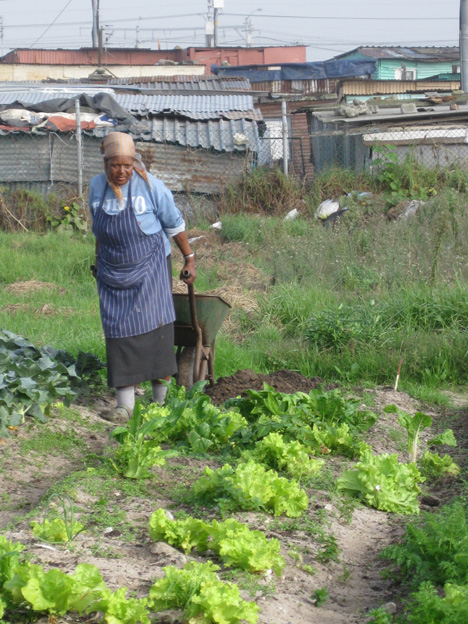EcoFood: Spicy Apple Sauce
Life is not orderly. No matter how we try to make life so, right in the middle of it we die, lose a leg, fall in love, drop a jar of applesauce. – Natalie Goldberg It took me a while,… Read More »EcoFood: Spicy Apple Sauce
Life is not orderly. No matter how we try to make life so, right in the middle of it we die, lose a leg, fall in love, drop a jar of applesauce. – Natalie Goldberg It took me a while,… Read More »EcoFood: Spicy Apple Sauce
One Tuesday a few weeks ago I accompanied Duncan Drennan (The Art of Engineering), Duncan’s beautifully pregnant wife Donne, Pia Taylor (Mother City Living), Stefan (a lecturer in applied mathematics at Stellenbosch) and Ruan (a helicopter pilot in training) on a tour of the Fezeka community garden in Gugulethu and the Harvest of Hope packing shed in Phillipi. Both the Fezeka garden (one of many community gardens) and Harvest of Hope form part of the Abalimi Bezekhaya organisation that assists urban farmers to produce food for themselves, their families and communities and to sell their surplus crops.
We started the tour at the BP service station on Rosmead Avenue where we were met by Rob Small, a friendly and enthusiastic man who works tirelessly to bring in funds for Abalimi, as well as running regular Tuesday morning tours of the gardens in a bid to win over more supporters to the project. Rob overflows with passion for the Abalimi project and what it is doing for people in Cape Town’s townships. His enthusiasm is infectious and seeps into everything he says.

Rob lead the way into Gugulethu and Fezeka, where he explained how 40% of the residents of Cape Town’s informal settlements are unemployed, and where there’s poverty, there is also hunger. The core business of Abalimi is to combat poverty by growing food sustainably (and organically) both at home and in community gardens, and to further green the township areas by planting water wise indigenous trees in the schools and streets of the area. Rob explained that when the Abalimi project started 15 years ago, their aim was to help people achieve subsistence from their growing activities. These days they have surpassed that and are aiming at providing a livelihood for those who before had a hard time even feeding themselves.
We were shown around Fezeka Garden and met some of the mama’s who run the place. There are very few men involved in growing community gardens on the Cape Flats, the majority of the farmers are women.

We were able to take photographs of the gardens and ask Rob questions about how Abalimi facilitates the creation of these food gardens. He explained that Abalimi “subsidises” the farmers to the tune of R150 per farmer per month (that’s around US $15 a month) by providing training, manure and set-up and maintenance of an irrigation system for each garden. This figure is much, much lower than the subsidies provided by government to commercial farmers. Abalimi also helps the farmers gain access to council land and negotiates on their behalf to obtain access to water, for example.
From Fezeka we moved on to the Harvest of Hope packing shed in Phillipi. Harvest of Hope is the marketing and selling arm of Abalimi. They collect the vegetables from the farmers once a week and take them back to the packing shed to wash and prepare for delivery. The vegetables make up weekly organic vegetable boxes that are distributed via some of Cape Town’s southern suburbs schools. (It is possible to buy a Harvest of Hope veg box even if you don’t have children at one of the selected schools, see below for more details).
I was blown away by the amazing fresh smell as we walked into the packing shed. It was a beautiful experience.
Read More »Abalimi Bezekhaya: Cape Town’s urban organic farmers
It’s World Environment Day and the launch day of Open Green Map, a global initiative to map out local natural, cultural and green living sites, to help people make greener lifestyle choices. There are launches being held around the world… Read More »Open Green Map (and Cape Town Green Map) launches today
“What I say is that, if a fellow really likes potatoes, he must be a pretty decent sort of fellow.” – AA Milne Mashed potato is my absolute number one comfort food. It really sticks to your ribs, makes you… Read More »EcoFood: Veg Mash
“Soup of the evening, beautiful Soup!” – Lewis Carroll Continuing the series of vegetarian food that even non-vegetarians can enjoy (and reduce their carbon footprints accordingly), here’s my roasted butternut soup recipe, a real favourite with my family (secret: neither… Read More »Eco-Food: Roasted Butternut Soup
When Suzanne Forsling moved from the US Midwest to Alaska, she discovered this novel idea for keeping her salad crops off the cold ground and away from critters who messed with them. She used new guttering, but there’s no reason… Read More »Eco-DIY: recycle old gutters into a vertical garden
Nothing will benefit human health and increase chances for survival of life on Earth as much as the evolution to a vegetarian diet. — Albert Einstein I’m not vegetarian. I have been in the past, I even spent a few… Read More »Eco-Food: Potato & Leek Soup
While most gardeners will agree that the gardening itself is a major part of the pleasure and that the fruits of your labours aren’t everything, there are those who are so busy that they simply don’t have time to plan… Read More »The food garden fairies
When budgets are tight, it’s important to know which fruit and veg are safe to buy non-organic, and which are the ones that you really should be shelling out the extra for. More and more scientists agree these days that… Read More »When buying organic is essential, and when it isn’t